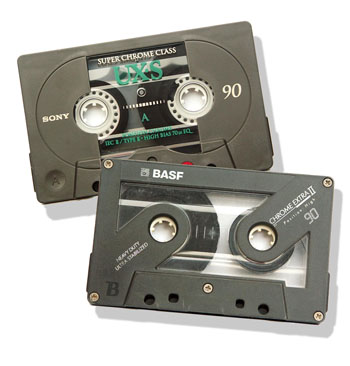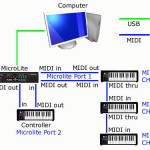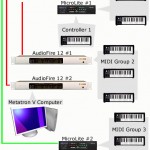
Years ago I decided to transfer all my reel tapes to computer. I hadn’t played these tapes for many years. When I loaded them up on the machine and tried to play them I was presented with a nasty squeal as the emulsion shredded off the tape. At first I thought it was a machine problem, considering I hadn’t used it in ages either. I broke down the machine for a complete inspection and cleaning. Once that was complete I loaded up a reel but was presented with the same problem.
I hit up the internet and found this was a common problem with various tape brands. Most of my tapes were Grand Master 456 and sure enough they were on the list. When Disney asked Wendy Carlos to digitally remaster the soundtrack to Tron she had the same problem with her tapes.
As I understand the problem, the tape is actually three components. You have the tape itself which is Mylar or Polyester. On the Mylar is a binder which holds the iron oxide. The iron oxide is what holds magnetic alignment — in other words, the music.
As the binder ages moisture cases it to break down and it no longer does its job. It becomes somewhat sticky and causes friction on the tape heads. It isn’t sticky to the touch, but it is sticky enough to grab on to the tape heads and pull the binder off the Mylar. Playing back tapes in this condition will destroy them as the iron oxide is no longer on the tape but stuck to various parts of your tape machine.
In the industry this is referred to as “oh shit!”
The cure is to bake the tapes in a dry 50-55 degree heat for a number of hours. This removes the moisture which has settled in the binder and re-fixes it to the Mylar tape.
There are a lot of different times and temperature formulas on the Internet but I’ve found the following to be the general concept – start with 4 hours and for every half inch of tape add one hour.
1/4 inch tape – 4 hours at 50-55 degrees.
1/2 inch tape – 5 hours at 50-55 degrees.
1 inch tape – 6 hours at 50-55 degrees.
2 inch tape – 8 hours at 50-55 degrees.
3 inch tape – 10 hours at 50-55 degrees.
There are people that say start with half that time and if the problem still exists then bake it for the remainder of the time. To me that seems like a waste of time. As long as you have even heat you won’t damage the tapes by cooking them the full amount.
The oven for baking is anything which creates a dry heat. The common oven is a simple food dehydrator. Place the reels in your cold oven and let them warm slowly. Flip the tapes every hour. Once complete let the tapes cool slowly in the oven. I guess it is a bad idea to play these back warm because the tape can stretch. Makes sense to me.
With that information in mind I raided our kitchen and stole the food dehydrator. It ran a bit hotter than I needed so I extended its size using a large cardboard box. It looked a little like a life size cardboard R2-D2 when I was finished.
I baked all my 1/2 inch reel tapes for around 5-6 hours at 50-55 degrees. Once cooked I let them cool slowly in my R2-D2 oven. It worked perfectly and I was able to restore all my music.
Sticky tape returned to haunt me.
Last night I was going through more of my old cassette tapes and had a small stack of tapes that wouldn’t play. Some were really bad and they had so much resistance it would slow the playback down to a crawl – in some cases even stop playback all together. I tried moving the little reels into different cases but that didn’t work.
Then I was reminded of baking tapes.
I had thought for a moment about this but didn’t give it much thought as I’ve already gone through over 50 cassettes and only had 3-4 which had the problem. To top that off, these were tapes that survived a small flood in an old studio of mine. I assumed from day one it was the gunky flood water the tapes soaked in that had ruined them.
But, what the hell, let’s bake these and see what happens. It won’t wreck anything and will only waste a bit of my time.
I no longer have a food dehydrator and regular ovens are a really bad idea (the heat is too moist). I’ll have to build something. I grabbed a large cardboard box and wrapped it in towels to retain heat. I made a hole in the top and shoved the working end of a hair dryer in it. I lowered in a digital thermometer and turned the hair dryer on low fan, warm heat and let it run for 10 minutes. I checked the thermometer. It was maintaining a heat of 50 degrees. Perfect.
I removed the little reels from the cassette tapes. I flipped over a ceramic baking dish and put the reels on the bottom. I figured this would warm to 50 degrees as well and retain an even heat.
I dug around on-line but couldn’t find baking times for cassette reels. I figured these were much smaller than 1/4 inch tape reels so perhaps just cutting that time in half would be enough. I cooked the tapes for about 2 to 2.5 hours and let them cool.
That did the trick.
I would recommend removing them from the cases before you bake them. There is a little felt pad behind the tape which is held with glue. I think the heat might screw that up and melt the glue. There is also the two pieces of non-slip paper thing which sit between the reels and the housing. I do not know what effect heat would have on these. There are also two small spindles on the lower corners inside the housing. These seem to be made of a different softer plastic and I’d be worried these would melt. Lastly, the point of entire exercise is to remove moisture from the reels. I actually think the cassette housing would help retain some of this moisture.
Taking the reels out of the housing is pretty simple (5 little screws) so you might as well.
I did not have a problem with the little plastic cassette hubs melting or warping so I wouldn’t be concerned with that. If you are I suppose you could take the extra step of removing the plastic hubs while baking, but I wouldn’t want to get in to that.
Before I played my newly baked cassette tapes I cleaned the tape heads. When I was finished I cleaned them again to see if there was any binder left behind. Nope. I didn’t see any on the swab.
After cooking, one of my tapes was still a bit wonky and it started to wobble a bit on playback. Rewinding and playing the song again seemed to fix the problem. I’m going to assume my baking time for this tape wasn’t quite long enough.
So at the end of the day cassette tapes are prone to the sticky tape problem and it is possible to bake them to cure it. If I had to do this again I think I would bake them for 3 to 3.5 hours.
Who knows, I might have to do this again. I still have about 100 tapes left to go though.
Discuss this on the message board
Update: This fix did not last long! It is said baking larger reel tapes will fix it for several months. Most of my reel tapes were transferred within a week so I have no first hand experience on how long it lasts.
After I baked the cassette reels and let them cool I spend the time transferring them right away. Less than 24 hours later I tried to play one and it has returned to it’s original crap sticky status. Perhaps it is because I didn’t bake it long enough or this particular brand of tape (Verbatim) is extra crappy. In any case, I would keep this in mind when you do your own cassette baking. I’d be interested in hearing from someone else who has done this and if they had the same results.






Recent Comments